
“The gut” isn’t one part of the body, it actually refers to several key organs that are home to trillions of microbes. Probiotics are among the most important of these microbes, helping maintain balance and proper function. Supplementing with the best probiotics have been shown to positively influence the gut microbiota, with different strains displaying different effects for the body.
The gastrointestinal tract includes the mouth, oesophagus, stomach, small intestine, and large intestine. When these organs host a healthy microbiome, they support digestion, immunity, and even mental well-being. If you experience bloating, digestive issues, low mood, or recurring infections, it may indicate an imbalance in your gut microbiome and underlying inflammation, which is where probiotic supplements can help.
Research from one study has found that people who struggled with low mood tended to have a less diverse gut microbiome compared with other participants in the study, and that certain species of bacteria have been linked with experiencing more negative emotions.
In a separate study, researchers found that probiotic, prebiotic and synbiotic supplements (those that combine both probiotics and prebiotics) could help reduce the effects of some mental health problems, such as anxiety and depression, as well as stress, sleep and even Alzheimer’s disease.
“Our gut microbiome has been linked to the health of pretty much every organ in our body. So gut hormone connection, gut skin connection, gut metabolism connection, all of these different connections,” explains Dr Megan Rossi, a gut health expert with a PhD in probiotics. “Technology has allowed us to understand exactly how powerful our gut microbes are [...] our gut health uncovers how we can look better, feel better and live longer, happier lives,” she adds.
There’s a reason scientists refer to the gut as a second brain – a disrupted gut also has the power to affect our mood. The gut-brain axis is the direct link between your gut and your brain, so any issues with your gut flora can also affect your mental wellbeing. Gut microbiota – the hundreds of species of bacteria living in our guts – have been shown to influence our physical and mental health.
In short, these bacteria are incredibly powerful, and if your diet isn’t providing enough, a supplement could help fill the gap. With the help of expert advice, I put some of the best probiotics to the test to see which ones really deliver results.
Read more: 6 best vitamin B12 supplements to take, according to an expert
The best probiotics for 2026 are:
- Best overall – Nutravita 60 billion CFU pro bio cultures complex: £19.99, Amazon.co.uk
- Best budget buy – Bio-Kult everyday gut, 60 capsules: £20, Boots.com
- Best for women – Vida Glow gut pro: £30, Spacenk.com
- Best duo cap – Epetōme: £54.99, Epetome.com
- Best liquid supplement – Symprove: Was £49.99, now £37.50, Symprove.com
- Best multivitamin with a probiotic – You’re Looking Well day pill: £45, Ylwclub.com
How I tested
I consulted experts (Sophie Medlin and Dr Megan Rossi) to discern what probiotics are, their role within the body, the different strains of bacteria to look out for and the most beneficial doses. I researched a range of probiotics for various needs and tested each one for at least a month and up to three months. I noted any changes to skin health and any stomach issues, and judged each supplement based on its compatibility with a balanced diet.
Read more: Best multivitamins for women, men and children, according to experts
Nutravita 60 billion CFU pro bio cultures complex
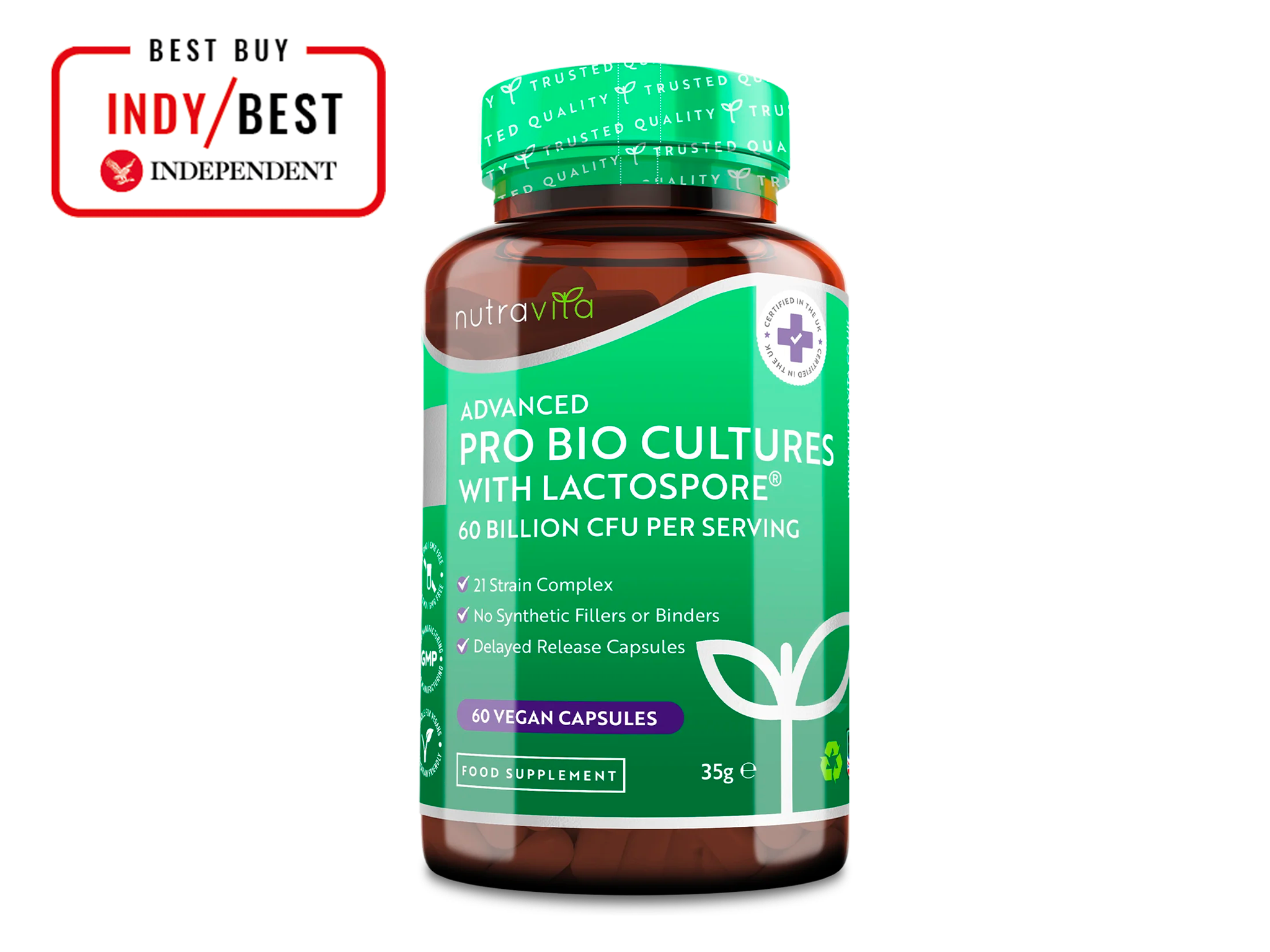
Best: Overall
Supplement type: Capsules
Number of days’ supply: 30
Vegan: Yes
CFU count: 60 billion
Number of bacteria strains: 21
Why we love it
- Excellent value for money
- Diverse strains and high potency
Take note
- Plastic bottle
Packed with an impressive 21 different strains of bacteria and delivering an enormous 60 billion CFU (colony-forming units) per daily dose, this potent probiotic supplement is a big hitter, and at a reasonable price. The capsules themselves are easy to swallow, and the pill bottle can be stored in a cupboard without refrigeration.
This supplement contains clinically studied bacteria strains, such as bacillus coagulans, lactobacillus acidophilus and bifidobacterium infantis. Plus, it’s gluten-free and suitable for vegans, making it a good choice for most people looking to care for their gut health.
I took the recommended two pills a day and felt my digestion became noticeably more efficient within days. That manifested as more frequent and easier bowel movements, with no wind or stomach bloating. The positive results meant I was keen to carry on taking the supplement.
Buy now £19.99, Amazon.co.uk
Bio-Kult everyday gut
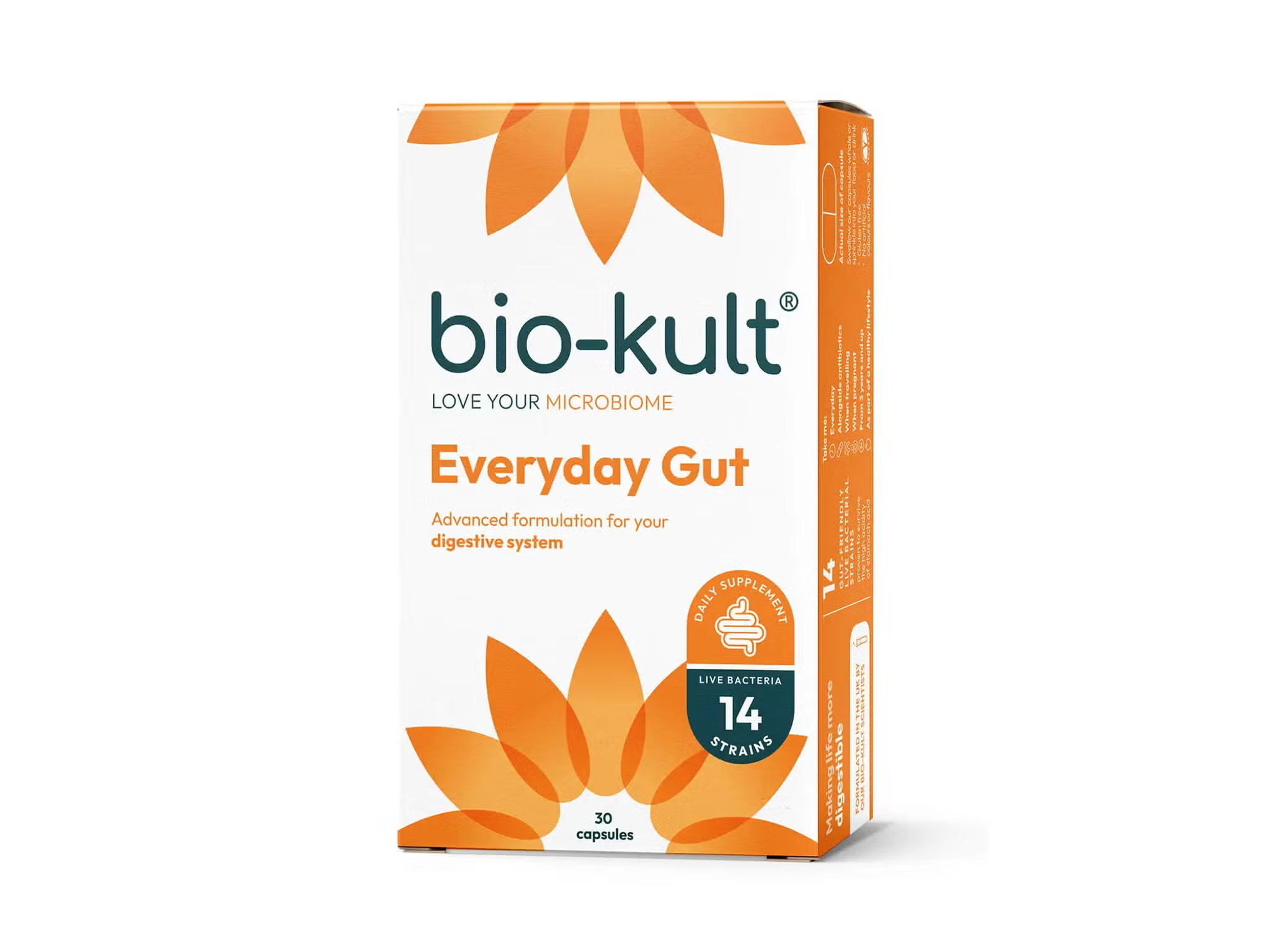
Best: Budget probiotic
Supplement type: Capsules
Number of days’ supply: 60
Vegan: No
CFU count: 2 billion
Number of bacteria strains: 14
Why we love it
- Can be taken with antibiotics
- Suitable for all the family
Take note
- Not suitable for vegans
As with most things in life, consistency is key when taking care of your gut health. For this reason, you’ll need a supplement that fits in with your monthly budget – there’s little point in just taking a supplement for a month and then stopping. Enter: Bio-Kult everyday gut supplement, a more budget-friendly probiotic compared with other brands.
Adults can take up to four capsules each day, while children can take up to two. However, I found there were benefits even when taking just one capsule a day. This is likely because this award-winning supplement contains 14 different live bacteria strains, with each capsule containing 2 billion live bacterial micro-organisms for your gut.
If you’re taking Bio-Kult while travelling or you’re on a course of antibiotics, a higher dose of four capsules is likely to be more effective for a short while.
Read the full Bio-Kult probiotics review
Buy now £20, Boots.com
Vida Glow gut pro
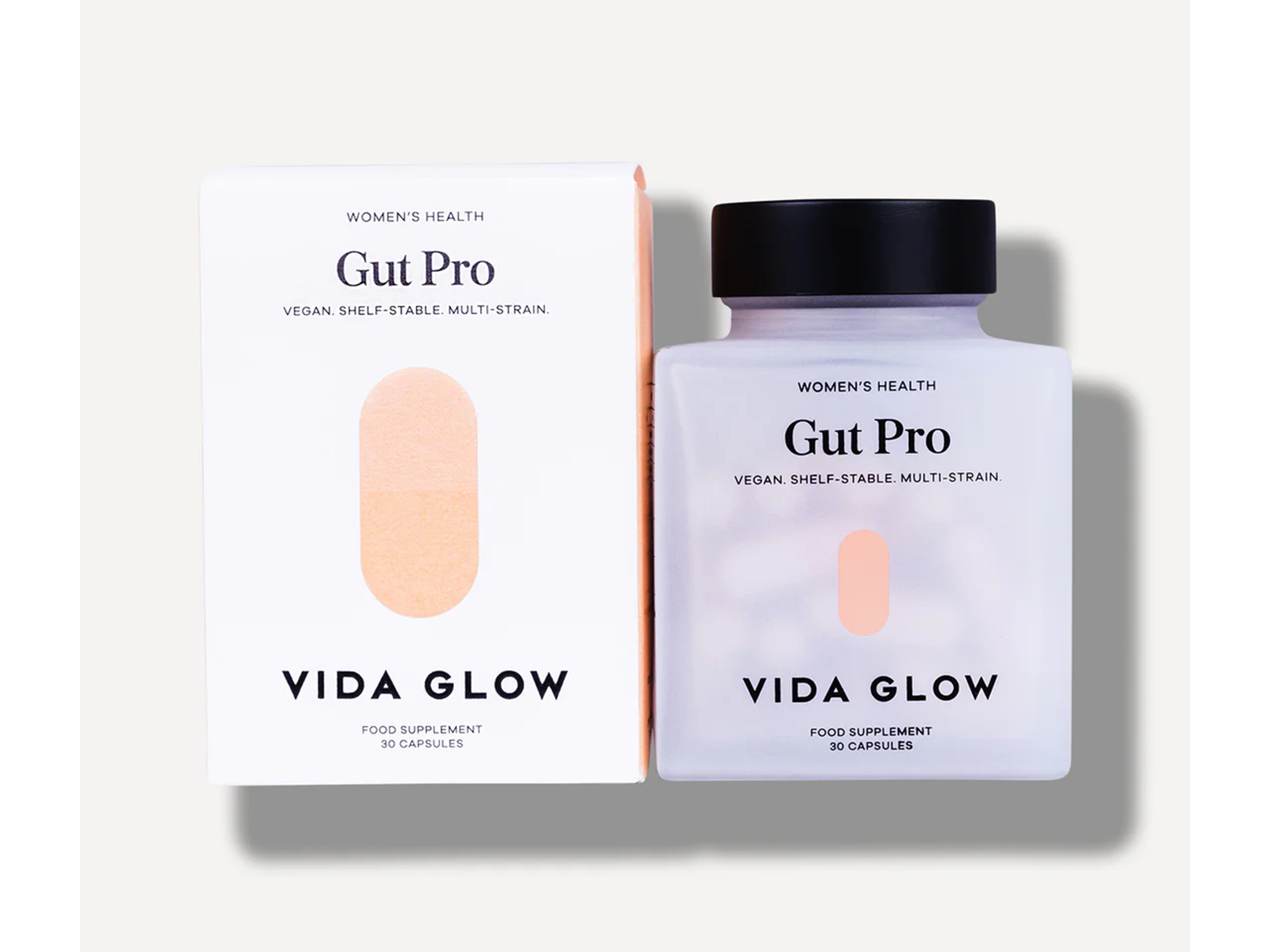
Best: Probiotic for women
Supplement type: Capsules
Number of days supply: 30
Vegan: Yes
CFU count: 6 billion
Number of bacteria strains: Three
Why we love it
- Designed specifically for women
- Contains medicinal herbs to promote digestion
Take note
- Best taken 30 minutes before your first meal of the day
- Not suitable for pregnant or breastfeeding women or people with a corn allergy
We are all aware of the friendly bacteria in the gut, but did you know that women also have a vaginal microbiome? A healthy vaginal microbiome is dominated by lactobacillus. These bacteria are known to create the optimal antimicrobial environment, but when levels drop, this can lead to conditions such as bacterial vaginosis, thrush and other infections caused by bacterial imbalance and overgrowth.
Vida Glow’s gut pro has been specifically developed with women’s health in mind. Each one-a-day capsule holds 6 billion CFU of three lactobacillus species – lactobacillus plantarum, lactobacillus rhamnosus and lactobacillus reuteri– to nourish gut flora and support intimate health.
Besides probiotics, the supplement also includes the medicinal herbs ginger and gentiana lutea to improve digestion and relieve bloating, making this a good all-rounder for women. I found it maintained a happy gut and didn’t experience any issues like thrush or BV while taking it.
It is, however, among the pricier options included in this round-up, working out at £1 a day.
Buy now £30, Spacenk.com
Heights biotic+
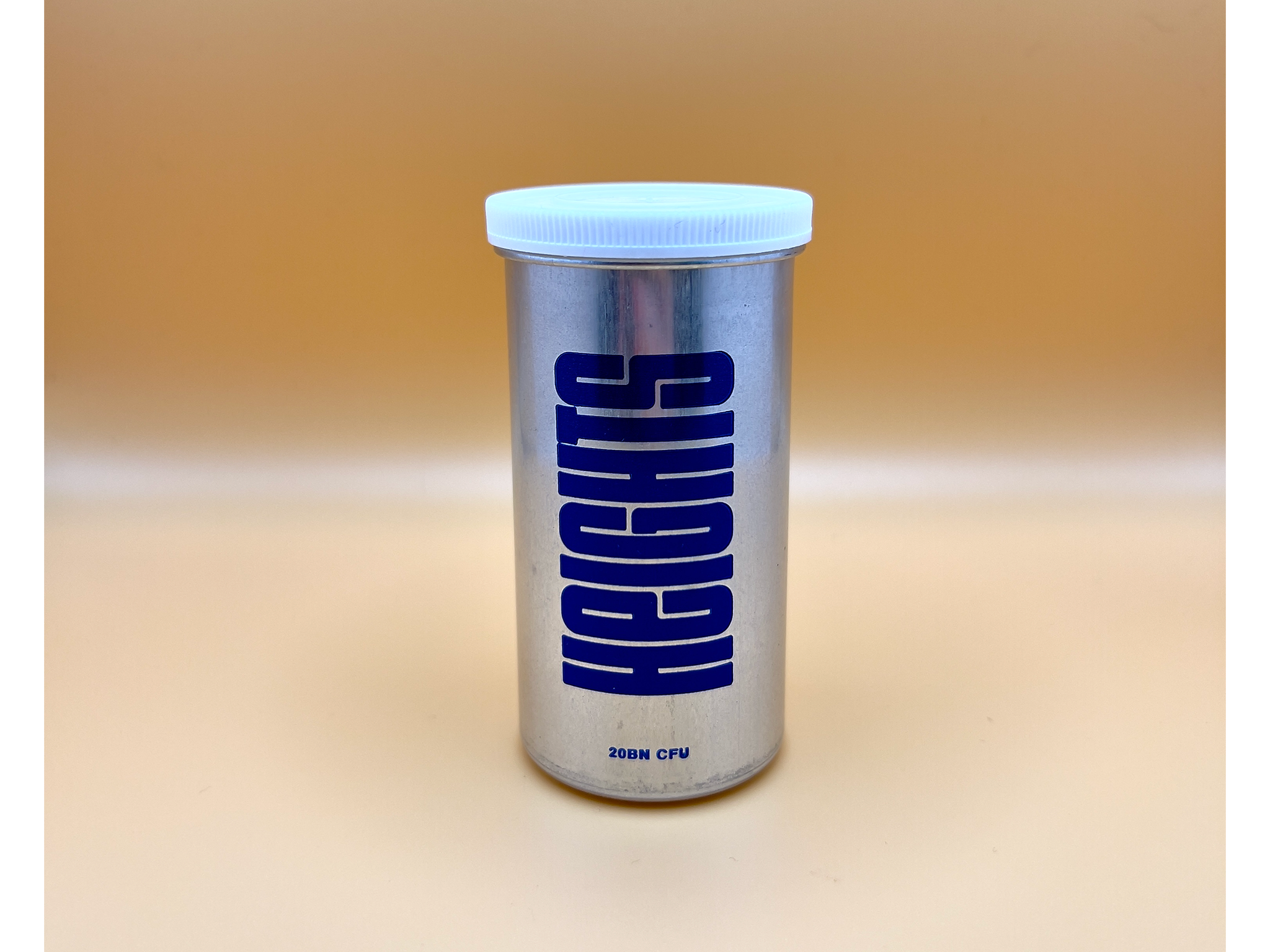
Best: Vegan probiotic
Supplement type: Capsules
Number of days' supply: 30
Vegan: Yes
CFU count: 20 billion
Number of bacteria strains: 7
Why we love it
- Clinically studied bacteria strains
- Proven to allow bacteria to reach gut alive
- Contains zinc
Take note
- Costly but better value for money with a subscription
Claims about the bacteria in probiotics reaching the gut alive are not new, but Heights has backed up the claim with a study. The results of its third-party research found that most of the bacteria in its smart probiotic do indeed reach the colon alive, where they can do their job. That’s said to be because of its delayed-release capsule that breaks down nine times more slowly than those from some of its competitors. Impressive stuff.
Besides the scientific backing, l liked that the supplement – which contains seven strains of gut-friendly bacteria – was convenient to take, because there’s no particular time it should be taken. Plus, it can be taken with or without food.
I was thrilled that this vegan supplement is suitable for all, regardless of diet and lifestyle choices. Plus, I noticed an almost immediate reduction in bloating, which can be a common issue for some following a plant-based diet.
Buy now £40, Yourheights.com
Artah enhanced synbiotic
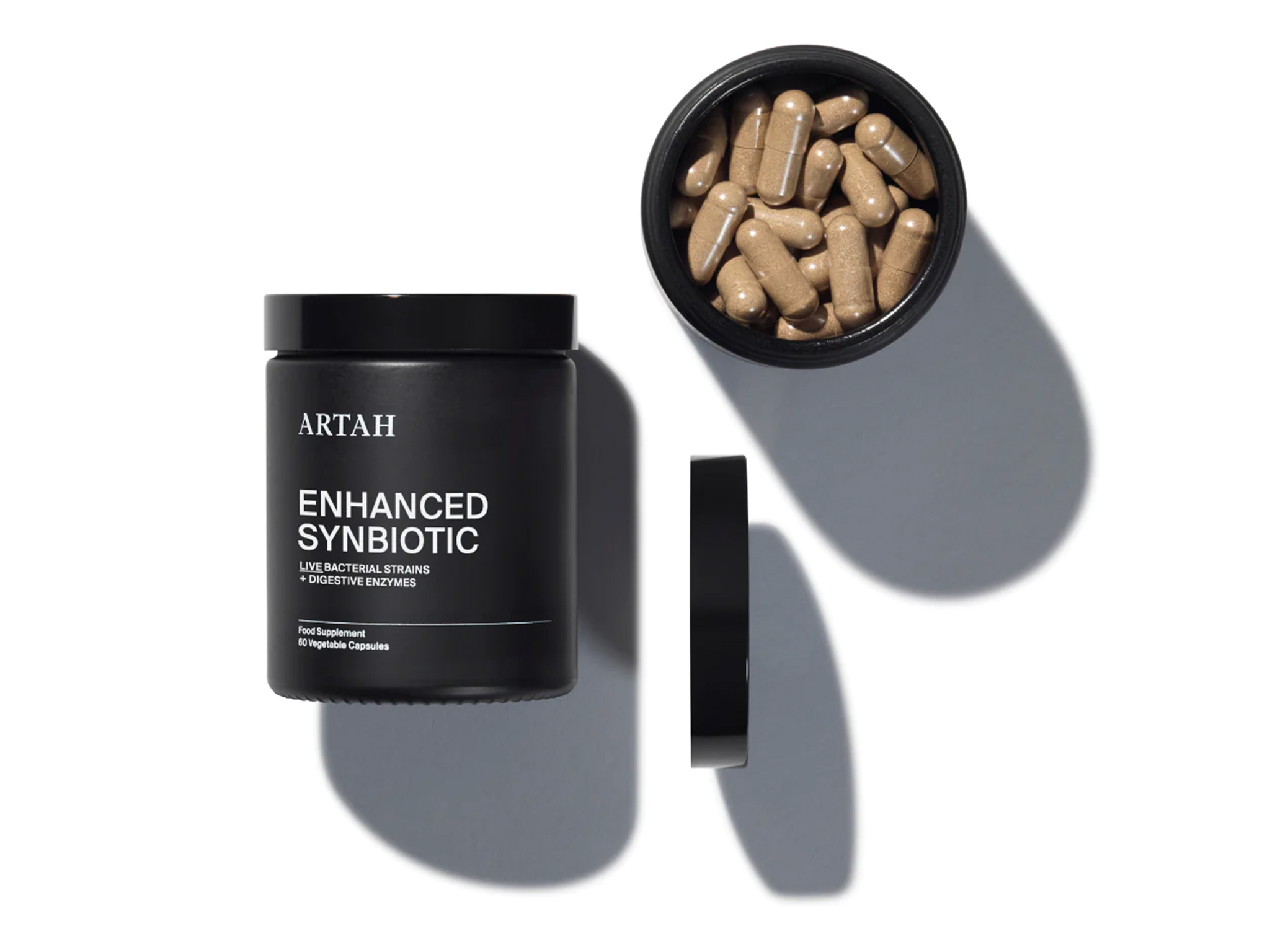
Best: Probiotics for use with antibiotics
Supplement type: Capsules
Number of days' supply: 30-60
Vegan: Yes
CFU count: 8 billion if taking one a day
Number of bacteria strains: 11
Why we love it
- Combines prebiotics, probiotics and digestive enzymes
- Can be taken with antibiotics to replenish gut bacteria
- Refillable to reduce carbon footprint
Take note
- Only suitable for over-16s
Taking antibiotics can help the body fend off infections, but they can also decimate the friendly bacteria living in our gut. Luckily, Artah enhanced synbiotic is safe for use with antibiotics – just take the supplement two hours either side of your prescribed medication to give your gut microbiota a fighting chance.
Included in the 11 strains of clinically studied bacteria strains are those that are said to boost mental, sexual, metabolic, immune, skin and digestive health, while added digestive enzymes, such as amylase and lipase, help our bodies break down and absorb nutrients in the food we eat.
I started off with a one-a-day dose of Artah enhanced synbiotic, then upped that to two capsules a day. Before long, I noticed a reduction in bloating and a more comfortable feeling in my stomach.
This is one of the more expensive options on this list, but you can save when you subscribe and receive regular deliveries to keep you topped up.
Read the full Artah probiotic review
Buy now £39, Artah.co
The Nue Co prebiotic and probiotic supplement
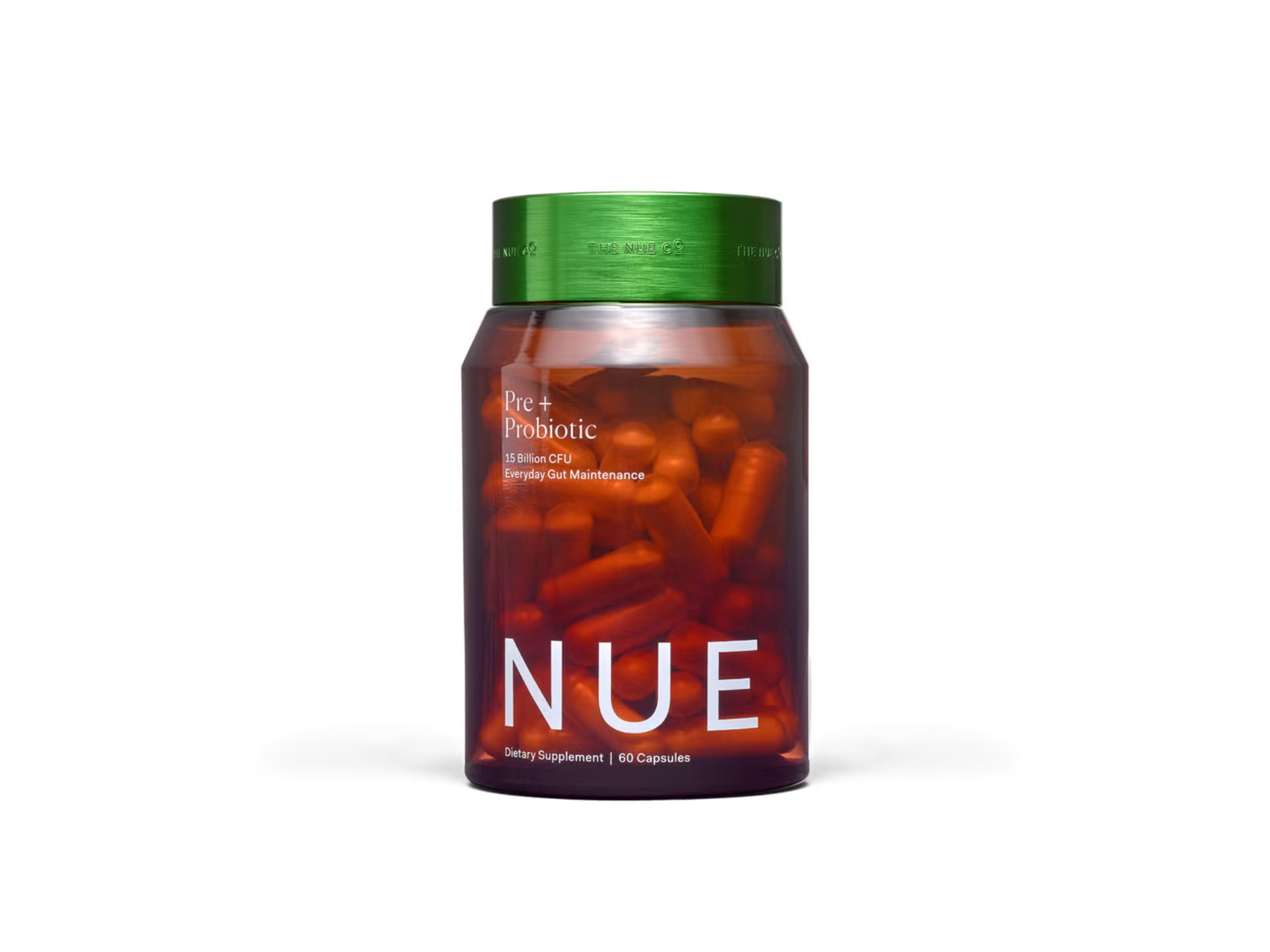
Best: Synbiotic
Supplement type: Capsules
Number of days' supply: 30
Vegan: Yes
CFU count: 100 billion
Number of bacteria strains: 1
Why we love it
- Combines probiotics and prebiotics
- Refillable to reduce carbon footprint
Take note
- Pricey but better value with a subscription
Jules Miller, one of The Nue Co’s co-founders, has described her own issues with IBS, so it’s hardly surprising the brand knows its stuff when it comes to gut health. This supplement, which delivers probiotics and prebiotic inulin fibre from Jerusalem artichoke root, was developed specifically for people with IBS but is also a good all-rounder for those without specific gut problems.
It’s slightly unusual because it contains spores instead of the typical live bacteria, and that means the 15 billion spores per dose don’t start working until they reach your small intestine.
This is meant to give them a better chance of survival as they move through your body – the contents of many supplements can be destroyed by stomach acid before they can do any good, depending on how they’re formulated.
I have become a regular user of prebiotics and probiotics since taking these supplements, thanks to improved digestion and generally feeling more comfortable.
Read the full The Nue Co’s probiotic supplement review
Buy now £75, cultbeauty.co.uk
You’re Looking Well day pill
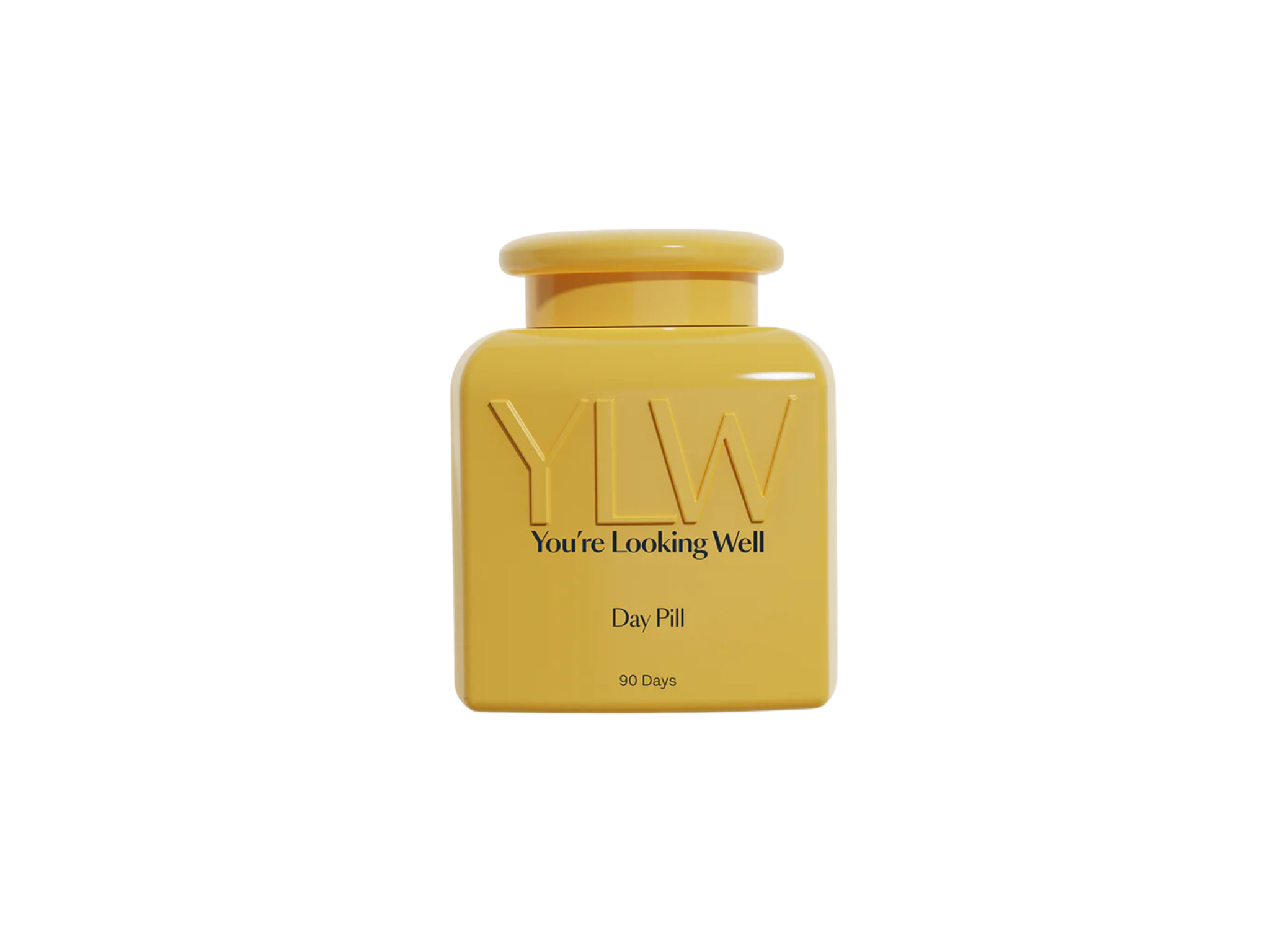
Best: All rounder
Supplement type: Capsule
Number of days’ supply: 90
Vegan: Yes
CFU count: 21 billion
Number of bacteria strains: 3
Why we love it
- Contains a blend of nutrients
- Improves skin and gut health
- One capsule a day instead of several
Take note
- Expensive
It might be the most expensive probiotic in this guide, but the day pill from You’re Looking Well also offers your daily dose of vitamin D and 10 other essential nutrients to support skin, gut health and immunity in a 90-day supply.
The supplement has been designed to replace your existing probiotic and multivitamin supplements, placing everything you need in a single capsule to be taken once a day. While the price is high, it could save you money on all those other supplements and simplify your routine.
With vitamin K, B12, B6, folate, zinc and a host of other nutrients, as well as three strains of probiotic bacteria (lactobacillus paracasei, bifidobacterium lactis and bifidobacterium lactis), I found issues with bloating improved after a month of taking the day pill. It also worked well at healing my sore, break-out-prone skin, particularly when combined with the brand’s gentle probiotic day cream.
Claudia Winkleman says she swears by the supplement, and it’s also gluten-free and non-GMO, so if you’re looking for a solid all-rounder, this could well be worth the investment.
Buy now £45, Ylwclub.com
Epetōme synbiotic duo cap
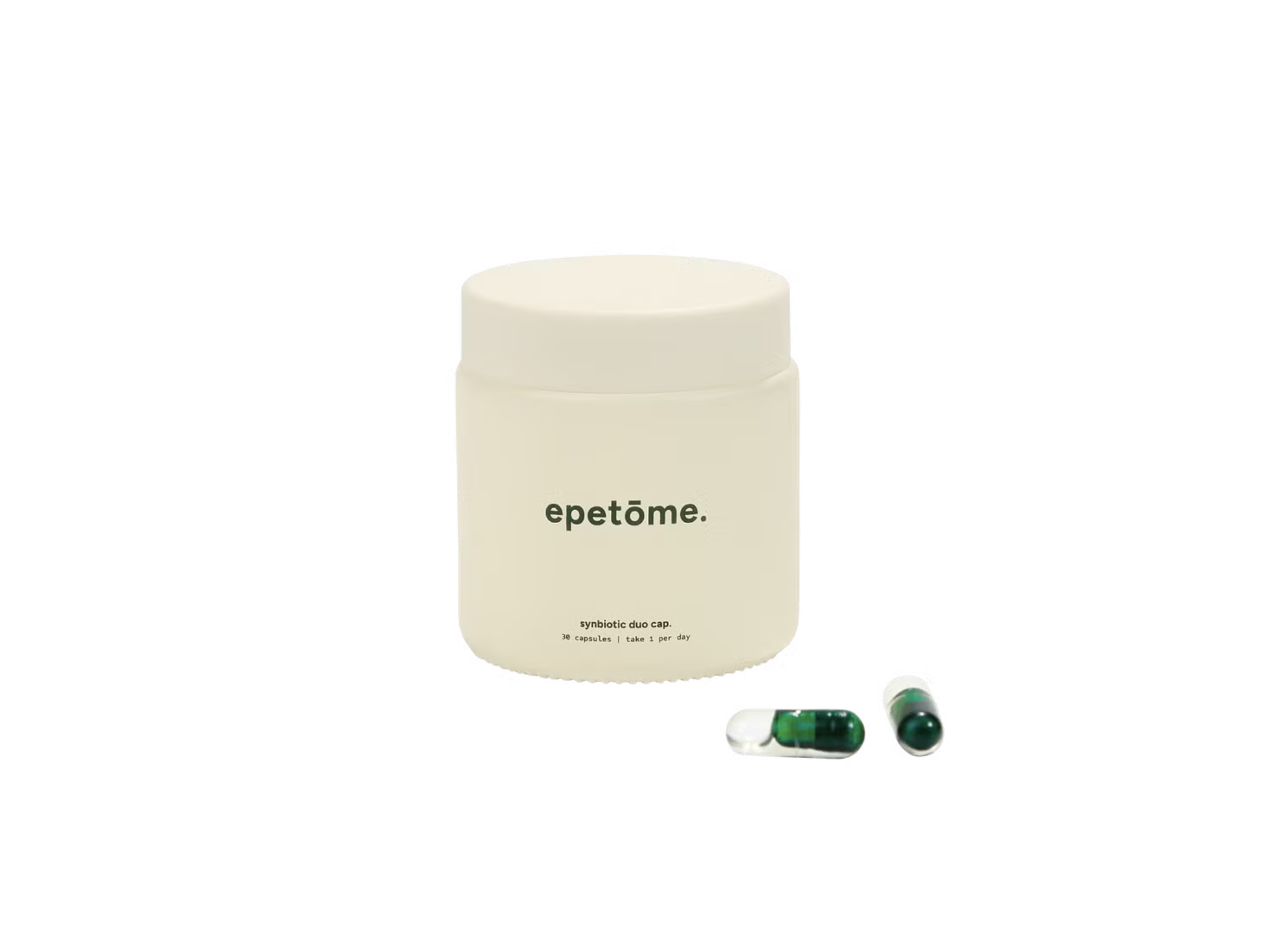
Best: Duo cap probiotic
Supplement type: Capsules
Number of days' supply: 30
Vegan: Yes
CFU count: 50 billion
Number of bacteria strains: 11
Why we love it
- Effective release capsule
- Highest CFU
- Added biotin, zinc and vitamin D3
Take note
- Expensive
Epetōme is the creation of nutritionist Emily English and offers something called “duo cap” technology. The capsule contains an outer and an inner core to make sure that the 50 billion live probiotic strains in the inner core reach your gut alive, unmarred by stomach acid.
English says this technology has been proven to be 30 times more effective at making sure the bacteria survive, compared to standard capsules. But the outer core does some heavy lifting too, releasing prebiotic FOS, vitamin D, zinc and biotin to top up your levels of these gut-balancing nutrients.
After four weeks of taking the Epetōme supplements, I was feeling great. My body had fully adjusted to the duo caps, and I was eating all the foods I usually enjoy with no complaints from my stomach. I didn’t feel any more or less tired than usual, and my mood was pretty stable and positive throughout the month.
Read the full Epetōme supplement review
Buy now £54.99, Epetome.com
Symprove daily
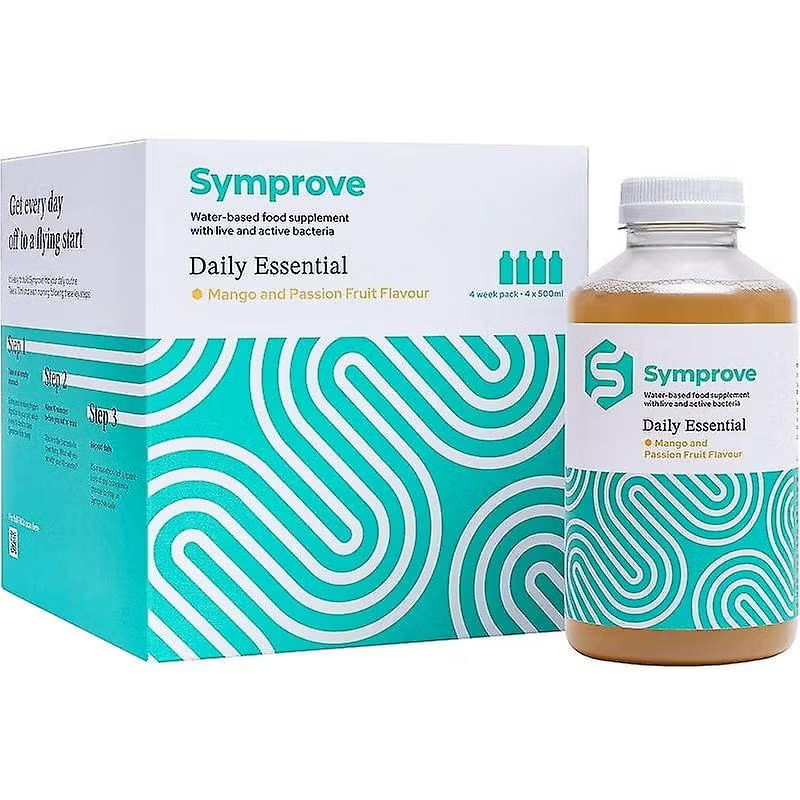
Best: Liquid supplement
Supplement type: Liquid
Number of days supply: 28
Vegan: Yes
CFU count: 10 billion
Number of bacteria strains: 4
Why we love it
- Reaches the gut alive
- Tastes great
- Four flavours available
Take note
- Has to be kept in the fridge
Symprove is a water-based formula containing live gut-friendly bacteria. Though the brand doesn’t specifically refer to it as a probiotic, it has probiotic qualities that can help keep your gut microbiome happy and balanced.
There are a range of flavours to choose from, including original, strawberry and raspberry, and mango and passionfruit. The formula is designed to withstand the stomach’s acidity, meaning the live bacteria can reach the gut and it’s a great gut health supplement for anyone who struggles to swallow capsules and pills.
I took my 70ml shot every morning and started looking forward to the strawberry and raspberry-flavoured drink each morning. The formula is gluten free, dairy free, and vegan, with no added colours or flavours. It needs to be kept in the fridge, however, the brand also offers a travel option that doesn’t need to be refrigerated.
And this is a time to give the supplement a try. The Independent has sourced an exclusive discount code that’ll save you 25 per cent on your first three deliveries (or the first 12 weeks of your subscription). Remember to use the code ‘INDEPENDENT25’ before 02/02/2026 11:59pm (GMT). This offer is for new UK customers only.
Not sure which flavour to go? You're in luck, because this offer also gets you three gifts that are worth £29 in total, including a mini bottle of every flavour to taste-test.
Buy now £37.5, symprove.com
Skin Diligent skin and biotics
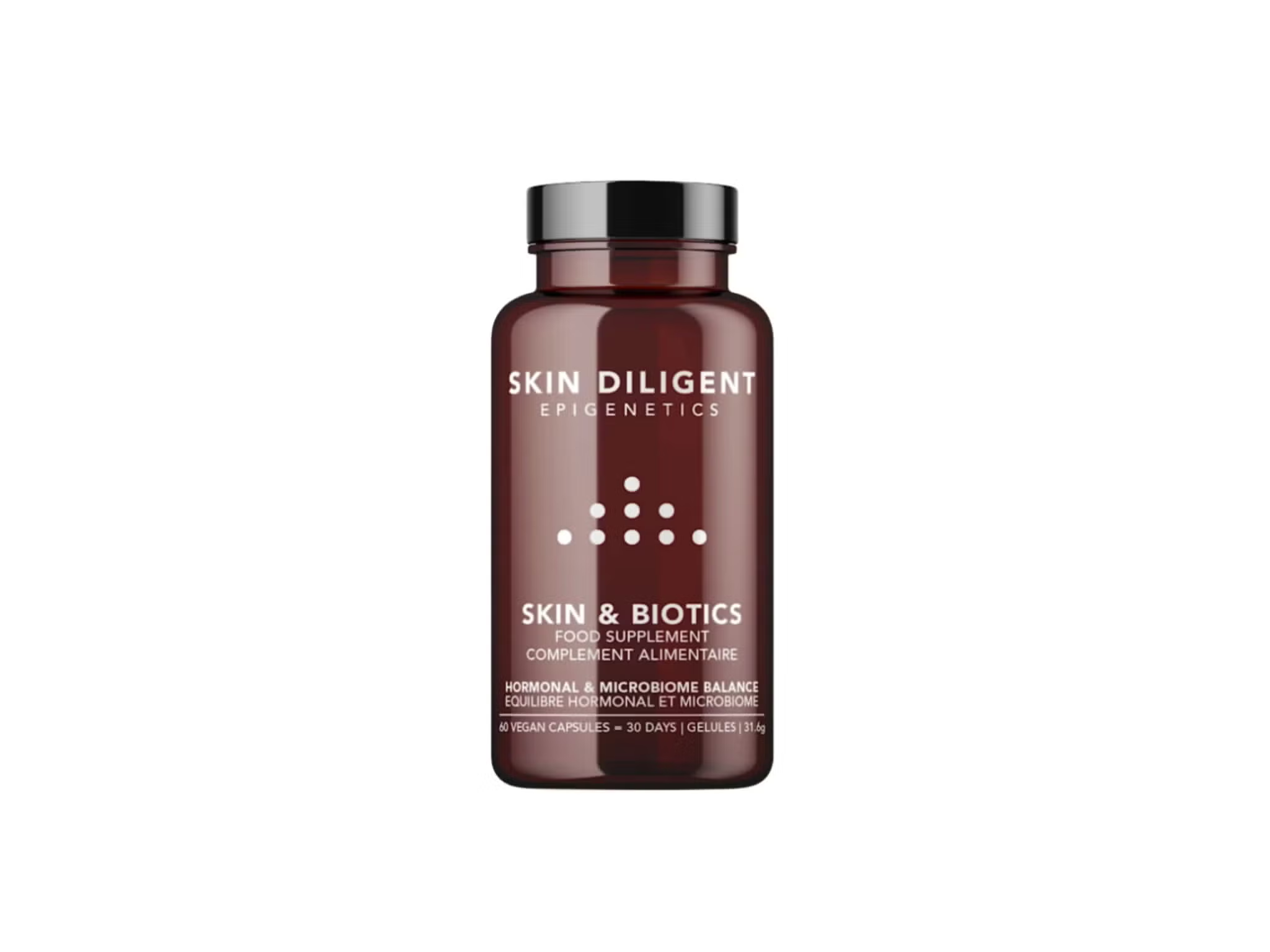
Best: Probiotics for clearing skin
Supplement type: Capsules
Number of days' supply: 30
Vegan: Yes
CFU count: 8 billion
Number of bacteria strains: 4
Why we love it
- Eco-friendly packaging
- Said to balance hormones and support skin health
- Packed with other vitamins and minerals
Skin Diligent’s skin and biotics is the result of four years of research and has been designed to support gut health, hormone balance and skin health. The supplement combines four strains of lactobacillus bacteria with a host of other vitamins and minerals – including vitamins D3, C, E and Bs, magnesium and zinc – for a robust daily microbiome-balancing treatment.
I recruited a 60-year-old to test these capsules. They took two capsules each morning, but the need to avoid tea or coffee for up to 40 minutes was a little harder. They reported feeling “brighter”, with a general sense of wellbeing, and better sleep with daily use – likely due to the added magnesium and D3. However, they also noted they’d need to take the supplement longer to notice a real difference in the condition of their skin.
Skin Diligent recommends a three-month course (£113, Skindiligent.com) of the supplement, then a one- to two-month break before resuming the treatment for another three months. You can also buy a single month’s supply (£42, Skindiligent.com).
Buy now £43, Skindiligent.com
Your questions on the best probiotics, answered
What is the best probiotic?
For the best bang for your buck, I’d recommend the Nutravita 60 billion CFU pro bio cultures complex. With such a diverse range of bacteria strains and a potent 60 billion CFU per daily dose, it holds its own even among the big guns with a much higher price tag, especially in terms of rapid positive results. Bio-Kult’s probiotic is also a very affordable option for those looking for daily gut care. For those looking for a high-quality synbiotic, I would recommend The Nue Co’s prebiotic + probiotic supplement, but maybe consider a subscription to make it more affordable. If it’s an all-rounder you’re looking for, You’re Looking Well’s day pill contains probiotic strains, your daily vitamin D and 10 other essential nutrients for overall skin and gut health.
How I tested probiotics
When testing, I considered the following:
Do you need a probiotic?
Of course, a diet that’s rich in probiotic cultures is easy to follow. Yoghurt is the most popular choice for most people, but other sources of natural probiotics are fermented foods like kimchi, pickles and sauerkraut and fermented drinks such as kombucha and kefir. Sourdough bread and cottage cheese are other gut-friendly foods.
If these foods aren’t things you eat on a regular basis, you might want to consider giving your gut a little help by way of a supplement. Supplements that contain probiotic bacteria vary – some contain a range of bacterial strains, others also contain prebiotic fibre, and others offer additional nutrients like vitamin D (read our round-up of the best vitamin D supplements here).
“We’re at a stage now with probiotics where you can select specific probiotic products for specific purposes,” explains Sophie Medlin, consultant dietitian and director at CityDietitians and one of the UK’s leading experts in gut health. “For example, there are strains that are great for constipation, strains that are great for bloating, but also strains that are good for your mental health, immunity and for reducing inflammation,” adds Medlin.
The potential benefit of probiotics is exciting, especially with consumer products at clinical grade now readily available. Medlin recommends speaking to a registered dietician if you’re looking to take gut health supplements to manage specific conditions. You might also want to test your gut health before taking a specific type of supplement.
What to look for in a probiotic supplement
Experts recommend choosing probiotic products with at least 1 billion colony-forming units (CFU) per daily dose. Research has shown some strains to be more effective than others for treating certain conditions, so it’s best to choose a probiotic that will achieve the specific effects you want, to ensure the product you choose is suitable for your particular needs. It’s best to talk to a healthcare professional to get some advice about specific conditions.
What is the most effective probiotic?
Look for probiotic products that contain strains of bifidobacterium, lactobacillus and saccharomyces – all of which have been found to provide health benefits, from helping your gut to treating diarrhoea. Different health concerns and different bodies will require different strains. For example, if you’re taking antibiotics, you might want to consider a different kind of probiotic than someone who is struggling with recurring thrush. Similarly, someone dealing with severe IBS might need a different combination of probiotic cultures than a person dealing with general low mood who feels run down all the time. The best way to discern which is right for you is to make a symptom diary, track the types of foods you’re already incorporating into your diet and then consult with a nutrition expert.
What is the best time to take probiotics?
While you can take your probiotic whenever you like, the advice suggests it should be taken on an empty stomach so the “good” or “friendly” bacteria can make their way to the gut as fast as possible, and at least 30 minutes before food. With this in mind, it’s probably best to take your supplement first thing in the morning, half an hour before breakfast. It is important to stay consistent with the time at which you take your supplement, so you can really see the benefits.
What are the benefits of probiotic supplements for gut health?
According to the NHS, “probiotics are thought to help restore the natural balance of bacteria in your gut (including your stomach and intestines)”. Dr Rossi explains that you don’t need to take a probiotic supplement, but that many people can benefit from the effects of taking one. These supplements don’t provide a one-size-fits-all solution, but they can help with soothing stomach issues like IBS, constipation, cramps and broader issues associated with hormones and immunity.
“If you have an underlying gut sensitivity, which is 20 per cent of the population, maybe it's because you've had a gut infection or an imbalance, or because of chronic stress, you can definitely have more sensitivities to foods.”
“Good gut health is like a muscle, so you need to train it. If you say, ‘okay, I'm quite unfit at baseline, I need to train these muscles’, that means having those small amounts of different probiotic foods, and your microbes then become incredible at adapting. They start to produce the right enzymes.”
What are the benefits of prebiotic supplements for gut health?
Research has shown that prebiotics may be able to improve digestion and metabolism, as well as help to regulate bowel movements. Additional benefits can also include improving calcium absorption and an increase in bone density. But, advises Dr Rossi, one should train their gut in the same way as they would with probiotics.
“We want to give our microbes food in an even spread. Some people have no fibre at breakfast and then have 30g in one meal, and that's going to cause anyone gut stress, right? So we want to even out the spread. You want to feed those microbes because they will look after you if you look after them.”
Which foods contain prebiotics?
There are many prebiotic foods that can help improve your overall body health as well as your gut microbiome. Examples of these foods include mushrooms, garlic, onions, cocoa powder, oats, flaxseeds, green veg such as asparagus and leeks, apples, nuts such as cashews and almonds, as well as many roots.
What is the difference between prebiotics and probiotics?
Probiotics are foods or supplements that contain live microorganisms that help to maintain or improve the “good” bacteria – otherwise known as normal microflora – in the body. Prebiotics, however, are typically high-fibre foods that act as food for microflora. A simple explanation is that probiotics are beneficial bacteria, and prebiotics are food for these bacteria.
How long do probiotics take to have a positive effect?
The speed at which you notice improvements when using probiotics depends on a range of factors, such as the age of the user, how often you take it and, of course, the product itself. Most people, however, are likely to notice positive effects on their digestion in one to two weeks.
Can probiotic supplements help with weight loss?
It’s important to note that the purpose of probiotics is not to aid weight loss, and therefore, should not be taken with that intent in mind. That being said, it's been shown that certain probiotics, such as Lactobacillus strains, may help people lose weight or body fat.
Why you can trust IndyBest reviews
Emilie Lavinia is The Independent’s fitness and wellbeing editor. Having reported on health and wellness for more than a decade, Emilie tests products with the help of experts like Medlin and Dr Rossi and helps the public discern between useful, quality supplements and overpriced products propped up by marketing jargon.
The IndyBest team also test a range of health-related supplements, from the best multivitamins to the best CBD oils to take according to experts, best probiotics, best way to get more B12 and even advice on how to manage menopause.
Meet the experts
Sophie Medlin is a consultant dietitian. She started her career working in hospitals where she specialised in gastrointestinal diseases. She now lectures at King’s College London and is the chair of the British Dietetic Association for London.
Dr Megan Rossi is one of the world’s leading experts on gut health and probiotics. Known as The Gut Health Doctor, she is an award-winning scientist and registered dietitian.
Learn more about your wellness with the best DNA testing kits. Or we’ve rounded up the best collagen supplements, multivitamins and menopause supplements.







